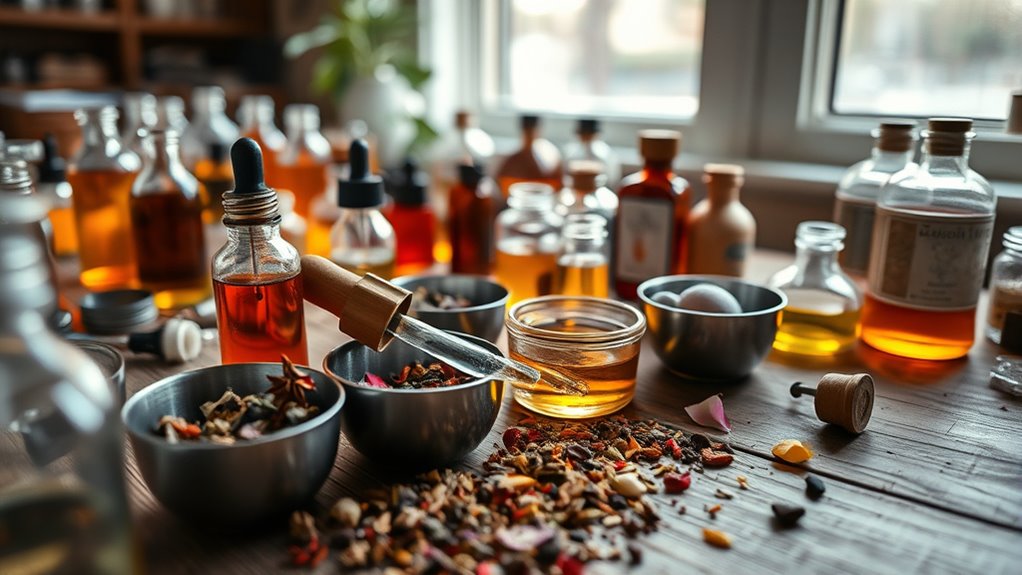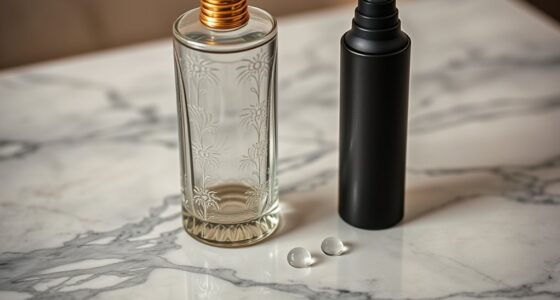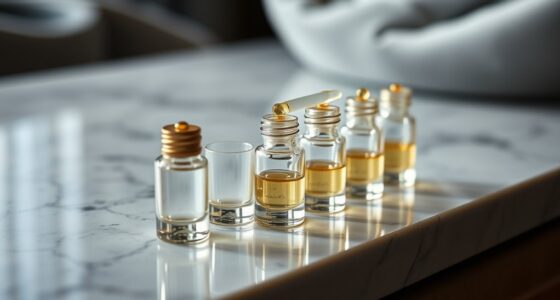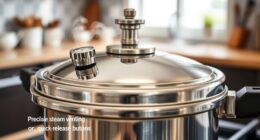As an independent perfumer, you blend artistry with ethics, using traditional techniques like cold-pressing and steam distillation to craft unique fragrances. You carefully select raw materials from eco-conscious suppliers, ensuring sustainability and transparency in each step. Small-batch production emphasizes quality over quantity, and you often draw inspiration from stories or places. Your focus on responsible sourcing and craftsmanship sets your work apart—exploring further reveals just how deeply you integrate sustainability into your process.
Key Takeaways
- Independent perfumers utilize traditional artisanal techniques like cold-pressing and steam distillation to extract nuanced scents from natural ingredients.
- They focus on small-batch production to prioritize quality, craftsmanship, and attention to detail in each fragrance.
- Raw materials are carefully sourced from eco-conscious suppliers, ensuring sustainability, transparency, and ethical harvesting practices.
- The crafting process is inspired by personal stories, memories, or places, blending natural ingredients to evoke specific moods or themes.
- Sustainability and eco-friendly practices are central, reflected in packaging, ingredient sourcing, and supporting environmentally responsible communities.
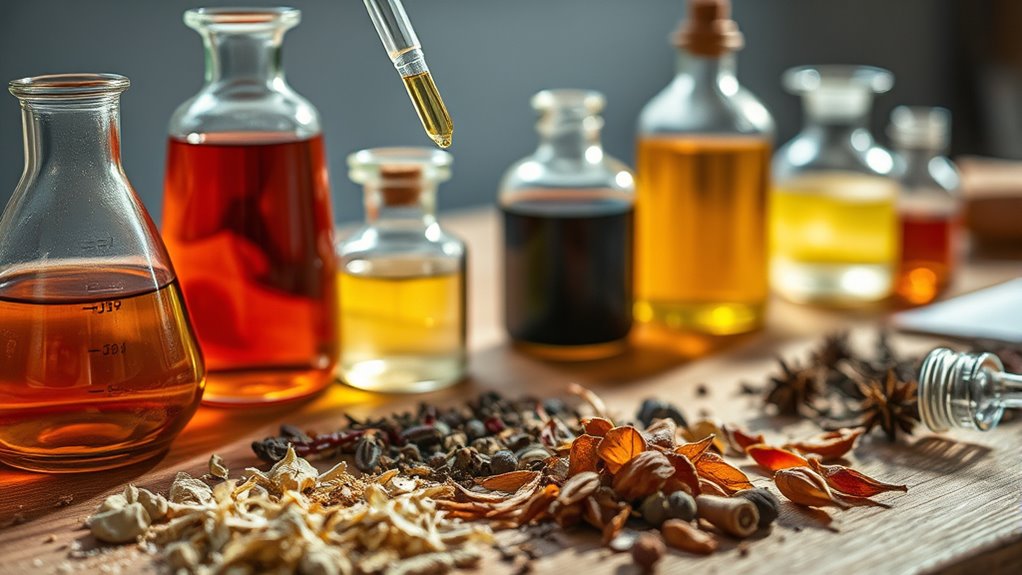
Perfumers are skilled artisans who transform raw ingredients into enchanting scents through a meticulous craft. When you work as an independent perfumer, you become a steward of both creativity and responsibility. You choose your ingredients carefully, prioritizing sustainable sourcing to guarantee your fragrances are environmentally friendly and ethically produced. This means sourcing botanicals, essential oils, and other materials from suppliers who practice environmentally conscious harvesting methods, often supporting local communities and preserving biodiversity. By incorporating sustainable sourcing into your process, you not only create unique scents but also contribute to a more sustainable industry. This commitment influences every step, from selecting raw materials to blending, distillation, and packaging.
Your craft relies heavily on artisanal techniques that have been refined over centuries. You often prefer small-batch production, focusing on quality over quantity, which allows you to pay closer attention to detail and preserve the integrity of each ingredient. These artisanal techniques involve traditional methods like cold-pressing, enfleurage, or steam distillation, which help you extract the purest, most nuanced aromas. Such methods demand patience and precision but reward you with complex, layered fragrances that mass-produced scents can’t match. As an independent perfumer, you have the freedom to experiment with these techniques, blending natural ingredients in innovative ways to craft signature scents that stand out in the market.
Your process begins with inspiration—perhaps a memory, a place, or a story you want to tell through scent. You select raw materials, mindful of their origin and quality, often working directly with growers or suppliers to ensure transparency and authenticity. Once you have your ingredients, you employ artisanal techniques to extract essential oils and absolutes, carefully balancing each component to achieve the desired aroma profile. You might create a fragrance that captures the freshness of an early morning meadow or the warmth of a cozy spice market. Throughout this process, sustainability remains central; you aim to minimize waste, use eco-friendly packaging, and support fair trade practices. This holistic approach guarantees your fragrances are not only beautiful but also responsible.
In addition, understanding the legislative changes related to ingredient sourcing and labeling can help you stay compliant and maintain consumer trust. Your craft is a blend of artistry, ethics, and craftsmanship. You dedicate yourself to mastering artisanal techniques and sustainable sourcing, knowing that each scent you create tells a story of respect for nature and tradition. Your commitment to these principles shapes the fragrances you produce—unique, genuine, and meaningful. This thoughtful approach sets your work apart in a crowded marketplace, allowing you to build a loyal following of scent enthusiasts who appreciate the artistry and integrity behind every bottle.
Frequently Asked Questions
How Do Independent Perfumers Source Rare Ingredients?
You source rare ingredients through dedicated networks, direct contacts, and specialty suppliers, ensuring each finds the perfect match for your scent. You prioritize ingredient authenticity by verifying purity and origin, often visiting farms or suppliers personally. This meticulous rare ingredient sourcing guarantees high-quality, genuine components, allowing your perfume to stand out with unique, authentic notes that reflect your craftsmanship and passion for exceptional fragrances.
What Tools Are Essential for Small-Scale Perfume Creation?
Think of your workspace as a painter’s palette—organized and ready for inspiration. Essential tools for small-scale perfume creation include precise droppers, small glass bottles, and a good scale for accurate DIY blending. Storage solutions like labeled jars and airtight containers keep your ingredients fresh and accessible. With these tools, you can craft beautiful scents efficiently, turning your ideas into fragrant masterpieces with ease and confidence.
How Do Perfumers Develop Unique Scent Combinations?
You develop unique scent combinations through scent layering, blending different notes to create complex, memorable fragrances. Use your creative inspiration to experiment with various ingredients, balancing top, middle, and base notes thoughtfully. Trust your nose and keep detailed records of each blend, adjusting proportions until you find the perfect harmony. This hands-on process allows you to craft distinctive perfumes that reflect your personal style and artistic vision.
What Challenges Do Independent Perfumers Face in Production?
You face sourcing dilemmas and branding hurdles that challenge your production process daily. Limited access to rare ingredients makes it tough to craft unique scents, while standing out in a crowded market demands strong branding. Balancing quality with cost becomes a constant struggle, forcing you to innovate creatively. Despite these hurdles, your passion drives you to find solutions, turning obstacles into opportunities for distinctive, memorable perfumes.
How Do Perfumers Decide on Pricing Their Fragrances?
You decide on pricing your fragrances by considering your market positioning and customer perception. If you aim for a luxury image, you might set higher prices that reflect exclusivity. Conversely, for a broader audience, you may opt for more accessible pricing. You also analyze competitors’ prices and factor in your costs, ensuring your price aligns with how customers perceive your brand’s value and uniqueness in the market.
Conclusion
You might worry that independent perfumers lack the resources of big brands, but their craft proves otherwise. Their passion and dedication mean each scent is a true work of art, crafted with care and precision. By choosing their creations, you’re supporting authentic artistry and unique personalities behind every bottle. So, don’t underestimate the power of independent perfumers—they bring originality and heart to the world of fragrance you won’t find elsewhere.
